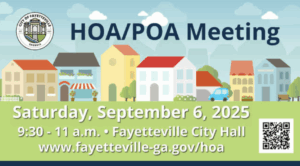Brown’s complaint: DOT unresponsive to Fayette concerns about effect on McCurry Park, overall traffic increases
The Fayette County Board of Commissioners voted at its Feb. 12 meeting to allocate more than $1 million for utility relocation on a road widening project that one commissioner said could be harmful to Fayette residents.
The Water Committee had recommended approval of $1.3 million in funding for water line relocation related to the Georgia Department of Transportation’s planned widening of Ga. Highway 54 East. But Commissioner Steve Brown, in a presentation that included Atlanta Regional Commission documents as well as minutes from a 2013 commission meeting, maintained that there are serious concerns about the project and the board should not earmark a dime toward it until they are addressed.
The state is looking to widen McDonough Road as well as Hwy. 54, and Brown said the DOT is pushing those project aggressively while the county is not.
Referring to a Sept. 26, 2013, commission meeting, Brown noted comments by DOT project manager Jeremy Busby and DOT board member Dana Lemon about the state being in favor of the projects.
As commission chairman at the time, Brown expressed concerns about the impact on McCurry Park as well as Public Works and Water System facilities on McDonough Road. He said last week that those concerns have never been addressed by state officials.
Brown said that plans for the road widening would greatly affect residents’ access to McCurry Park, one of the largest recreational facilities in the county. He wanted GDOT to help the county find a way to give families logical entry to the sports fields there, and suggested having the state assist with a multi-use path and box culvert, according to the 2013 meeting minutes.
As for the county facilities on McDonough Road, completion of the GDOT project would force trucks exiting onto that road to turn right and make a U-turn just to get to Hwy. 54. With large dump trucks as well as other trucks with large trailers hauling heavy equipment, such a maneuver could be either impossible or very dangerous, Brown said. He wanted the state to consider a possible extension road to take those vehicles to the next logical intersection for what he called “a legitimate left-hand turn.”
While reviewing those issues last week, Brown presented a copy of the ARC’s Atlanta Strategic Truck Route Master Plan which addresses the transfer of freight through the busy metro area amid other motorists. That document mentioned a number of roads through Fayette, including Hwy. 54, as having a significant impact on traffic.
Brown also brought up the Outer Perimeter project that was proposed in the 1990s for the greater metro Atlanta area. Showing a map of the suggested route that went through the southern edge of the county near Brooks, he pointed out how many counties including Fayette were opposed to the idea because they wanted the outer fringes of their counties to remain rural.
“They said the plan was dead and wouldn’t come back,” Brown stated about the Outer Perimeter. “I just want to tell you that nothing ever dies at DOT; they always come back.”
With that statement he produced a copy of ARC’s Atlanta Region Plan 2040, which includes a suggestion of reviving the Outer Perimeter idea. Then he showed how Hwy. 20 is now being widened between Canton and Cumming, and one business publication referred to that project as “the Northern Arc by another name.”
Using those projects to segue to the current issue facing Fayette, Brown discussed the ARC’s Metro Arterial Connector concept, which is the idea of taking existing state highways and building capacity on them to create a kind of outer arc that would be much less expensive than building new roads on virgin land. He said it is referred to in regional circles as a “state routes on steroids” project.
The southern part of that concept includes Hwy. 54 going straight through Fayetteville toward Peachtree City, Brown said.
“State officials will tell you that project was abandoned in 2012,” he said. “I will tell you it comes up over and over again in conversations with transportation planners as a good idea.”
The widening of Hwy. 54 would help that plan come to fruition but, while helping residents of Clayton and other surrounding counties get through Fayette more efficiently, it doesn’t do anything positive for Fayette residents, Brown said.
What it will do, he added, is simply put more cars and trucks on Fayette roads.
“There is a common adage in transportation: When you increase capacity, you increase volume. The volume always meets the capacity,” Brown said.
“Go to any highway in metro Atlanta that has been expanded and you will see that it’s just as congested as it was before the expansion. That’s exactly what’s going to happen here. If we increase the capacity on Hwy. 54 East, the volume will increase.”
Brown concluded his initial remarks by saying, “If you’re asking me to give you $1.3 million to do something which I believe will ultimately be detrimental to the county, I am not going to support it. This is like sentencing me to death by lethal injection and asking me to pay for the drugs. This is not a project we need to be interested in. It does not work to the benefit of the county or its citizens.”
Board chairman Charles Oddo asked for assurance that this vote would only set the money aside for possible future use and not commit to any immediate action, and county Administrator Steve Rapson said that was so.
“We have been notified by GDOT that they plan to widen Hwy. 54,” said Rapson. “It is a state project, not a county project. We have utilities in the right-of-way that we have to move out.”
Rapson added that the project is to be constructed sometime in 2019.
Oddo repeated his assertion that the board was only “setting aside” the funds. “We’re not building the road. The state’s not coming in yet.”
But Brown countered that the vote was in essence giving the state the money and giving them the go-ahead on the project.
“We absolutely explained to them what our problems are in a previous meeting two years ago, and they’ve done absolutely nothing to address our concerns but they want $1.3 million of our money so they can keep going with the project,” he said.
“If they can show us that they can make some significant changes to the design or somehow mitigate the harm they are going to do to Fayette County, I’m interested in looking at it. But they’ve done nothing up to this point, and I’d be very reluctant to give them a dime of our money to hurt our citizens.”
Commissioner Randy Ognio added that it might be wise to hold on to the money so the county would have some leverage in getting its concerns addressed, while allocating the funds would eliminate that leverage.
County Attorney Dennis Davenport reminded the board that “these are your utilities and their [the state’s] right-of-way. A condition of putting them in there was that if they want to widen that road, you have to move them. The $1.3 million isn’t for the road project per se; it’s to get your utilities out of their right-of-way so they can do their project.”
Rapson added that any other utility provider in that location, such as Georgia Power or AT&T, would have to do the same.
But Brown pointed out that the county has the ability to request that the state not go forward with the project.
“It’s on a list with thousands of other projects that aren’t getting done,” he said “They can stop a project at any time if they want to.”
Ognio called it “strange” that the state has not responded to any of the county’s concerns.
“If they’re going to have that kind of communication with us, why should we set the money aside?” he asked.
Brown also noted the future headaches the county could be bringing upon itself by going forward in this way.
“Think of the thousands of people that go to McCurry Park. We are going to get so many complaints from those people and the DOT knows we are,” he said. “What will be the additional cost to mitigate that problem and the one we’ll have at Public Works? We’ll have to build an auxiliary road and put in a traffic light there because it’s going to increase capacity and volume, not to mention possibly jeopardizing the lives of the people in those trucks.”
Oddo said all of these points were valid concerns but he still felt it was prudent to set aside the money.
Commissioner David Barlow moved to approve the request and Vice Chair Pota Coston seconded. It was approved 3-2, with Brown and Ognio in opposition.










Leave a Comment
You must be logged in to post a comment.